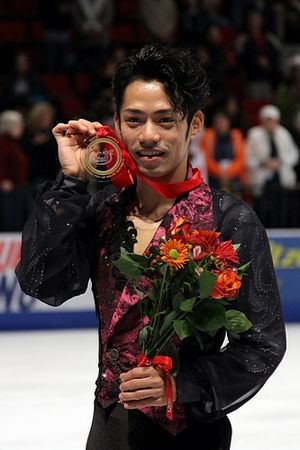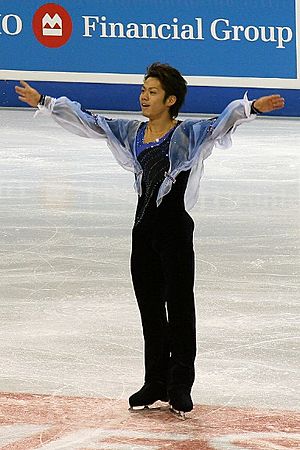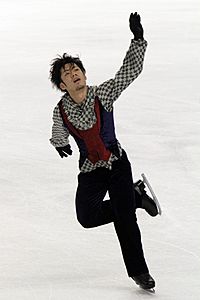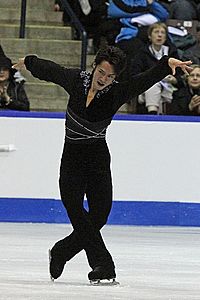Daisuke Takahashi facts for kids
Quick facts for kids
Daisuke Takahashi
|
|||||||||||||||||
|---|---|---|---|---|---|---|---|---|---|---|---|---|---|---|---|---|---|
| 高橋 大輔 | |||||||||||||||||

Takahashi at the 2010 Skate America
|
|||||||||||||||||
| Born | March 16, 1986 |
||||||||||||||||
| Alma mater | Kansai University (2015) | ||||||||||||||||
| Occupation |
|
||||||||||||||||
| Height | 165 cm (5 ft 5 in) | ||||||||||||||||
|
|||||||||||||||||
Daisuke Takahashi (高橋 大輔, Takahashi Daisuke, born March 16, 1986) is a famous Japanese figure skater and ice show producer. He competed in both men's singles and ice dance.
As a singles skater, he won a bronze medal at the 2010 Olympics. He was also the 2010 World champion. Daisuke won the 2012–13 Grand Prix Final and was a two-time Four Continents champion (2008, 2011). He also won the Japanese national title five times.
Daisuke Takahashi represented Japan at the 2006 Winter Olympics, 2010 Winter Olympics, and 2014 Winter Olympics. His Olympic bronze medal in 2010 was the first for an Asian country in men's singles. He was also the first Asian man to win a World title in 2010.
At the 2012–13 Grand Prix Final, he became the first Asian man to win a gold medal in that event. He was also the first Japanese man to win a medal at the Grand Prix Final in 2005.
Daisuke first retired from competitive skating in October 2014. However, he returned on July 1, 2018. After two seasons in singles, he switched to ice dance in the 2020–21 season. His partner was Kana Muramoto.
With Kana Muramoto, he won a silver medal at the 2022 Four Continents. They also became the Japanese national champions in 2022-23. Daisuke is the first and only skater to win medals at the Four Continents Figure Skating Championships in two different types of skating.
Even though he had a knee injury since 2008, his career lasted 16 seasons. This is much longer than most skaters. Daisuke is known for his amazing musicality and unique style. Many other famous skaters look up to him.
Outside of competitions, Daisuke has helped make Japanese ice shows more exciting. He leads Hyoen, a show that mixes different art forms like kabuki and Takarazuka Revue with figure skating. In January 2023, he started producing and directing shows with Ice Explosion 2023. He has also performed as a dancer in Love on the Floor.
Template:TOC limit=3
Contents
Skating Journey
Starting Out
Daisuke Takahashi was born in Kurashiki, Okayama Prefecture, Japan. He started figure skating when he was eight years old. A skating rink opened near his home, and he went with his mom to watch. He then joined the figure skating club. His mom actually wanted him to join ice hockey, but he didn't like the protective gear.
Daisuke had a great junior career. He won the 2002 World Junior Championships. This was his first and only time at that competition. He was the first Japanese man to win this title.
Senior Skating Career
First Years as a Senior Skater
For the 2002–03 season, Daisuke started competing as a senior. He found it hard to be consistent in his first few years. In 2004, he moved to Osaka for university. The university even built a rink for him and other top skaters.
Daisuke won a bronze medal at the 2005 Four Continents Championships. He then went to the 2005 World Championships. He was the second-ranked Japanese man on the team. When another skater got hurt, it was up to Daisuke to get spots for Japan at the 2006 Winter Olympics. He finished 15th, which meant Japan only got one spot for men's singles.
2005–06 Season
In the 2005–06 season, another skater, Nobunari Oda, also wanted the Olympic spot. Both Daisuke and Nobunari had good Grand Prix seasons. At the 2005–06 Japanese Championships, Nobunari was first. But then they found a mistake in the scoring. Daisuke was given the gold medal instead.
The Japanese Skating Federation decided to send Daisuke to the Olympics. Nobunari went to the World Championship. At the 2006 Winter Olympics, Daisuke started well. But he didn't skate his best in the free skate. He finished 8th overall.
2006–07 Season
In the 2006–07 season, Daisuke won a silver medal at 2006 Skate Canada International. Then he won gold at the 2006 NHK Trophy. He made it to the Grand Prix Final and won a silver medal, even though he was sick. He won the Japanese Championships for the second year. Then he won the Winter Universiade in Turin, Italy.
Daisuke was third after the short program at the 2007 World Championships. In the free skate, he had an amazing performance in his home country. He placed first in that part and won the silver medal. This was Japan's first silver medal in men's singles at the World Championships. After that season, the ISU ranked Daisuke first in the world.
2007–08 Season
In the 2007–08 season, Daisuke won gold at both his Grand Prix events. He then won silver at the Grand Prix Final. A few weeks later, he won his third Japanese national title. He was chosen for the Four Continents and World teams.
Daisuke won the 2008 Four Continents Championships. He set new record scores in the free skating and total score. He was expected to do well at the 2008 World Championships. But he had a disappointing free skate and finished off the podium.
In May 2008, Daisuke announced he was no longer working with Nikolai Morozov. Morozov had been his co-coach for several years. Daisuke continued training with Utako Nagamitsu and Takeshi Honda.
2008–09 Season: Injury Break
Daisuke was supposed to compete in the 2008–09 Grand Prix season. But he had to withdraw. On October 31, 2008, he tore a ligament in his right knee. He had surgery and missed the whole season. He was able to return to the ice in April 2009.
2009–10 Season: Olympic Medal
After recovering from surgery, Daisuke started the Olympic season at the 2009 Finlandia Trophy, which he won. For the Grand Prix season, he competed at 2009 Skate Canada International and 2009 NHK Trophy. He placed second at Skate Canada and fourth at NHK Trophy. These results qualified him for the Grand Prix Final. He led after the short program but finished fifth overall.
He won his fourth national title at the 2009–10 Japanese Championships. At the 2010 Winter Olympics, Daisuke won the bronze medal. This was Japan's first Olympic medal in men's figure skating. He then won the gold medal at the 2010 World Championships. He became the first Asian man to win a world championship in men's singles.
2010–11 Season
Daisuke's Grand Prix events for the 2010–11 season were the NHK Trophy and Skate America. He won both events. At the Grand Prix Final, he finished fourth.
Daisuke won the bronze medal at the 2010–11 Japanese Championships. He then won the 2011 Four Continents Championships. At the 2011 World Championships, he finished fifth. In May 2011, he had surgery to remove a bolt from his right knee. He said his knee felt lighter afterward.
2011–12 Season
To improve his skating, Daisuke worked with ice dance experts in France in August 2011. He said he wanted to make his skating technique even better.
At 2011 Skate Canada International, Daisuke won the bronze medal. At the 2011 NHK Trophy, he set a new personal best score in the short program. He won the gold medal and qualified for the Grand Prix Final, where he finished second. At the Japanese Championships, Daisuke won his fifth national title. He then won the silver medal at the 2012 World Championships.
Daisuke finished the season at the 2012 World Team Trophy. He set new personal best scores and finished first in the men's event. His short program score set a new record. This was his first win over Patrick Chan since the 2010 World Championships. In June 2012, Daisuke confirmed he would work with Morozov again as an advisory coach.
2012–13 Season
Daisuke showed his new free skating program at the 2012 Japan Open. It was the first time since his injury that he performed two quad jumps in his free skating. He placed first in the men's event, and Japan won the team gold. He changed to new skating boots in October, which affected his practice.
At the 2012 Cup of China, he won the silver medal. He also won silver at his next Grand Prix event, the 2012 NHK Trophy. This qualified him for his seventh Grand Prix Final. The 2012 Grand Prix Final was held in Sochi, Russia. Daisuke won his first Grand Prix Final gold medal. He was the first Japanese man to win gold at this event.
At the Japanese Championships, Daisuke finished second overall. He was chosen for the 2013 Four Continents Championships and the 2013 World Championships. He changed his short program to Moonlight Sonata. He finished seventh at Four Continents and sixth at Worlds.
2013–14 Season
In the 2013–14 Grand Prix season, Daisuke was fourth at 2013 Skate America. He then won the 2013 NHK Trophy.
At the Japanese Championships, he finished fifth overall. He was named to the Sochi Olympic team. At the Olympics, he finished sixth overall. He was supposed to compete at the 2014 World Championships but pulled out due to a knee injury.
Daisuke announced his retirement from competitive skating in October 2014.
Return to Singles Skating (2018–2019)
Daisuke announced his return to competitive skating at the start of the 2018–19 season. He placed second at the Japanese championships. However, he decided not to take part in international competitions.
Final Singles Season (2019–2020)
In September 2019, Daisuke announced that this would be his last season in singles skating. He planned to switch to ice dance with partner Kana Muramoto. He finished twelfth at the 2019–20 Japan Championships, which was his final singles competition.
Ice Dance Career with Kana Muramoto
2020–21 Season
After his singles career, Daisuke began training with Kana Muramoto in Florida. Their coach was Marina Zoueva. Daisuke's move to ice dance created a lot of excitement in Japan.
Due to the COVID-19 pandemic, Grand Prix events were mostly based on location. Muramoto and Takahashi traveled from Florida to Japan for their first competition, the 2020 NHK Trophy. They won the bronze medal. Daisuke said his mistakes were unusual but part of competing.
At their Japan Championships debut, they placed second in the rhythm dance. They finished third in the free dance after Daisuke fell. But they still won the silver medal overall. They were named as alternates for the World team. In February, they had to withdraw because Kana had a knee injury.
2021–22 Season
Muramoto and Takahashi started their season at the 2021 NHK Trophy. They finished sixth overall. Both skaters were happy with the results. They then won a silver medal at the 2021 CS Warsaw Cup.
At the 2021–22 Japan Championships, they competed against another top team for an Olympic spot. Muramoto and Takahashi both fell in the rhythm dance. They won the free dance but took the silver medal overall for the second year. They were named alternates for the Japanese Olympic team. They were also chosen for their first World Championship and the Four Continents Championships.
Muramoto and Takahashi won the silver medal at Four Continents. Daisuke became the first person to win Four Continents medals in two different types of skating. He said he was incredibly happy but also frustrated by his mistakes. They finished their season at the 2022 World Championships, placing sixteenth.
2022–23 Season
In May 2023, Muramoto and Takahashi confirmed they would continue for the 2022–2023 season.
After finishing sixth at the 2022 Skate America, they won their first gold medal as a team at the 2022 CS Denis Ten Memorial Challenge. They then finished sixth at the 2022 NHK Trophy.
At the 2022–23 Japan Championships, Muramoto and Takahashi became national champions for the first time. They were chosen for the 2023 World Championships and the 2023 Four Continents Championships.
They had some difficulties at the Four Continents Championships, finishing ninth. At the 2023 World Championships in Japan, Muramoto and Takahashi finished eleventh. This was the highest placement for a Japanese ice dance team at a World Championships. They also achieved a personal best score in the free dance.
Muramoto and Takahashi were Japan's ice dance team at the 2023 World Team Trophy. They finished fourth in the rhythm dance and fifth in the free dance, setting new personal bests. Team Japan won the bronze medal.
They announced their retirement in May 2023. Daisuke explained that his long-term knee injury made it impossible to continue improving as an athlete. Kana decided to retire with him to perform in professional shows together.
Life After Competing
After his first retirement in October 2014, Daisuke mainly performed in ice shows. These included Hyoen, Art on Ice, and Ice Legends. He also worked as a reporter and sports caster for Fuji TV. He interviewed many interesting people and reported live from the 2016 Summer Olympics and 2018 Winter Olympics.
In 2016, Daisuke helped test new technology that combined projection mapping with figure skating. This technology was later used in the show Hyoen - Basara (2017). This was the first time projection mapping was used in a Japanese ice show.
In 2016 and 2017, Daisuke performed as a dancer in Love on the Floor. In 2018, he worked on his first project as a 'total coordinator' for a real estate company. He designed the inside and outside of a building in Asakusa, Tokyo.
After his second retirement in May 2023, Daisuke has continued to perform in ice shows. He performs solo and with Kana Muramoto. In February 2024, he produced his own ice show called Kassouya. He had already produced the second Ice Explosion show in January 2023.
In 2024, Daisuke and Kana Muramoto choreographed a program called Symmetry. They performed it at the Prince Ice World tour. For Friends on Ice 2024, he choreographed his solo program Wake up, you're dreaming.
Since April 2024, he has been a co-host on the TV show Poka Poka on Fuji TV. In July and August 2024, he made his acting debut in the movie Kura no Aru Machi (The City of Warehouses). The movie was filmed in his hometown of Kurashiki. He plays a museum curator in the film.
In October 2024, Daisuke founded an official fan community called F-Ske. He started it with other famous skaters like Shizuka Arakawa and Kana Muramoto.
Notable Ice Show Appearances
Daisuke Takahashi has performed in many ice shows around the world. Here are some of the most important ones:
Producer and Performer
- Ice Explosion (Japan) (2023)
- Kassouya (Japan) (2024, 2025)
Headliner / Chairperson
- Kobe charity show (Japan) (2011-2015)
- Christmas on Ice (Japan) (2014-2018)
- Hyoen (Japan) (2017, 2019, 2024)
- Ice Explosion (Japan) (2020)
- LUXE (Japan) (2021)
Dancer
- Love on the Floor (Japan) (2016, 2017)
Cast Member
- Prince Ice World (Japan) (2006-08, 2010-14, 2016, 2018-19, 2023-25)
- Friends on Ice (Japan) (2006-2014, 2016-17, 2019, 2022-24)
- Stars sur glace (France) (2007)
- The Ice (Japan) (2007, 2016-17, 2023)
- Stars on Ice (Japan) (2007-08, 2010-13, 2015-16, 2022)
- Festa on Ice (South Korea) (2008)
- Carnival on Ice (Japan) (2008-13, 2016-17)
- Fantasy on Ice (Japan) (2011, 2014)
- Art on Ice (China) (2012)
- Art on Ice (Japan) (2013)
- Denis Ten and Friends (Kazakhstan) (2014)
- Art on Ice (Switzerland) (2015, 2017)
- Ice Legends (Switzerland) (2016)
- Golden Moment (Hawaii) (2017)
- Bloom on Ice (Japan) (2023, 2024)
Personal Life
Daisuke Takahashi was a student at Kansai University. He has three older brothers.
After his first retirement from skating, Daisuke moved to Long Island, New York. He took English classes at a local university. He also studied different dance styles at the Broadway Dance Center.
In January 2023, he announced a small change in the spelling of his name. In 2023, Daisuke moved from Osaka to Tokyo.
Public Life and Endorsements
After winning the silver medal at the 2007 Worlds, Daisuke appeared in many media shows. He also performed in many ice shows in Japan. He was invited to the French team's show Stars sur glace in Paris. In 2008, he performed at Festa On Ice in South Korea.
In July 2007, the Japanese Olympic Committee chose Daisuke as a "JOC symbol athlete." This program helped him get funding from JOC partner companies. After his win at the 2010 Worlds, Daisuke appeared on many TV shows. He also became an advertising spokesperson for campaigns like "Use pesticides safely" and Japan Post.
Skating Programs
Ice Dance with Muramoto
| Season | Rhythm dance | Free dance | Exhibition |
|---|---|---|---|
| 2022–2023 |
|
|
|
| 2021–2022 |
|
|
|
| 2020–2021 |
|
Men's Singles

| Season | Short program | Free skating | Exhibition |
|---|---|---|---|
| 2019–2020 |
|
|
|
| 2018–2019 |
|
|
|
| 2013–2014 |
|
Beatles medley:
|
|
| 2012–2013 |
|
|
|
| 2011–2012 |
|
|
|
| 2010–2011 |
|
|
|
| 2009–2010 |
|
|
|
| 2008–2009 | Did not compete this season |
||
| 2007–2008 |
|
|
|
| 2006–2007 |
|
|
|
| 2005–2006 |
|
|
|
| 2004–2005 |
|
|
|
| 2003–2004 |
|
|
|
| 2002–2003 |
|
|
|
| 2001–2002 |
|
|
|
Filmography
- The Tales of Kurashiki (2025)
See also
 In Spanish: Daisuke Takahashi para niños
In Spanish: Daisuke Takahashi para niños
 | Jessica Watkins |
 | Robert Henry Lawrence Jr. |
 | Mae Jemison |
 | Sian Proctor |
 | Guion Bluford |



